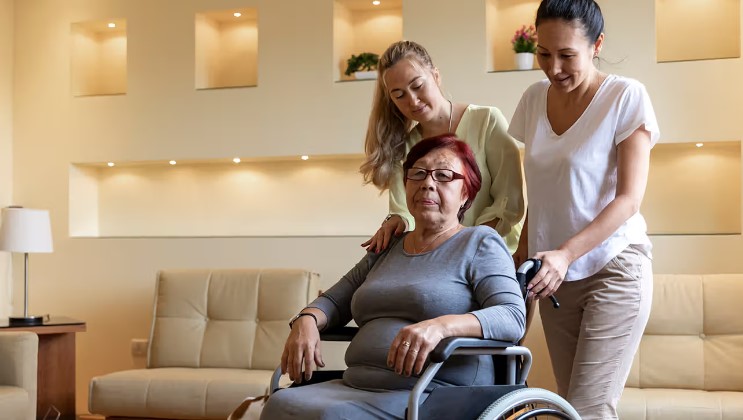
A Caregiver’s Guide to Finding Support for Someone with Alzheimer’s Disease.Caring for someone with Alzheimer’s disease can be overwhelming, but there are numerous options available to assist caregivers. These include facility care, in-home care, and various daily support services. Below, we outline some of the key types of care and supportive programs available.
Types of Care
Caregivers have multiple options to choose from, depending on individual needs and circumstances. These options can provide both short-term and long-term assistance, whether at home or in a specialized facility. The best care option will often depend on the unique needs of the person with Alzheimer’s and their caregiver.
Day-to-Day Support
Several programs offer daily support, providing services such as meals, nursing care, and recreational activities. Here are a few options to consider:
Adult Day Programs: Many organizations offer adult day programs that allow caregivers to continue working while providing support during the day. These programs typically include socialization, recreation, nursing care, and sometimes additional services like physical therapy or mental health programs.
Meal Delivery Programs: Many communities offer meal delivery services for individuals with chronic conditions like Alzheimer’s disease, ensuring that they receive nutritious meals without the need for a caregiver to cook.
Respite Care: Respite care provides temporary relief for caregivers, allowing them to take vacations, undergo medical procedures, or simply enjoy a break. During this time, the person with Alzheimer’s can reside in a care facility.
Long-Term In-Home Care
Long-term in-home care offers services such as companionship, hygiene assistance, nursing care, and medical care delivered directly in a person’s home. These services can complement the care provided by a primary caregiver and can be an excellent option for some individuals with Alzheimer’s disease.
There are two primary types of long-term in-home care: home care and home healthcare. While these options may sound similar, they offer different types of support to individuals with Alzheimer’s and their caregivers.
Home Care Services: Provided by home care aides, these services assist with daily activities such as bathing and dressing but do not include nursing care. Home care aides can also help with light household tasks such as meal preparation, cleaning, and running errands. Their visits can range from a few hours to an entire day.
Home Healthcare Services: Offered by home healthcare companies, these services involve visits from a range of medical professionals, including nurses, nursing assistants, physical therapists, and mental health counselors. Unlike home care services, home healthcare does not typically include household tasks such as cleaning or meal preparation. Professionals usually stay for only a few hours to provide medical and therapeutic care.
Residential Care
Residential care can be an ideal option for many individuals with Alzheimer’s disease, offering round-the-clock care in a safe and secure environment. This type of care ensures safety, medical supervision, and the assurance that care is provided by professionals.
There are several types of residential care options available:
Assisted Living Facilities: These facilities are a good choice for individuals in the early stages of Alzheimer’s disease. They provide 24-hour care and are typically staffed by nursing assistants and care aides. These aides assist with tasks such as bathing, dressing, and daily self-care.
Nursing Facilities: Skilled nursing facilities offer more comprehensive services than assisted living facilities. They have nurses on staff around the clock and can care for individuals with advanced medical needs, making them a suitable option for those in the later stages of Alzheimer’s disease.
Memory Care Units: Some assisted living and nursing facilities have specialized units for individuals with memory-related conditions. These units often feature staff with additional training and safety measures, such as alarmed doors, to ensure a secure environment.
Hospice Care
The goal of hospice care is to provide comfort during the final days, weeks, or months of a person’s life. Hospice care focuses on pain relief and family support and can be provided in multiple settings, including:
- Home
- Nursing facilities
- Assisted living facilities
- Dedicated hospice facilities
Who Can Help
Being a caregiver for someone with Alzheimer’s can be overwhelming, but there are various sources of support you can turn to:
Geriatric Care Managers: These professionals assist caregivers in finding services for individuals with conditions like Alzheimer’s disease and help establish care plans. They are often social workers or nurses specializing in geriatrics.
Community Social and Mental Health Workers: These workers are valuable resources for locating services and exploring payment options. They frequently work in settings such as adult day centers, senior centers, and public hospitals.
Family, Friends, and Neighbors: Reaching out to your personal network can be beneficial. Friends, family members, and neighbors can assist with care, meal preparation, household tasks, and more.
Organizations That Help
In addition to individuals, there are organizations that provide support and assistance to caregivers. Some options include:
- Eldercare Locator
- Aging Life Care Association
- National Institute on Aging Information Center
- Local Organizations: Contacting local branches of major national organizations can also be helpful. For instance, you can reach out to your local branch of:
- The Area Agency on Aging
- The Alzheimer’s Association
- Meals on Wheels
National Nonprofits
Nonprofits dedicated to Alzheimer’s disease serve as excellent sources of support for caregivers. Consider reaching out to:
- The Alzheimer’s Association
- The Alzheimer’s Association of America
Federal Services
Federal programs also offer support for caregivers, including:
- The National Institute on Aging-supported Alzheimer’s Disease Research Centers
- The Alzheimer’s and Related Dementias Education and Referral (ADEAR) Center
Financial Support
Financial assistance can be crucial for many caregivers. Several organizations provide financial support, particularly for reducing the cost of prescription medications. These programs include:
- TogetherRx Access
- NeedyMeds
- Medicare Extra Help
For more information on managing prescription medication costs, read on [here].
Other Support
Additional resources are available to connect you with support services at any time. These providers can be contacted 24/7 for assistance:
- Alzheimer’s Association 24/7 Helpline
- Community Resource Finder
